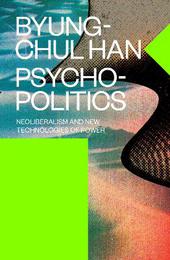
|
Psychopolitics: Neoliberalism and New Technologies of Power
Paperback / softback
Main Details
| Title |
Psychopolitics: Neoliberalism and New Technologies of Power
|
| Authors and Contributors |
By (author) Byung-Chul Han
|
|
Translated by Erik Butler
|
| Physical Properties |
| Format:Paperback / softback | | Pages:96 | | Dimensions(mm): Height 198,Width 129 |
|
| Category/Genre | Social and political philosophy |
|---|
| ISBN/Barcode |
9781784785772
|
| Classifications | Dewey:320.51 |
|---|
| Audience | |
|---|
|
Publishing Details |
| Publisher |
Verso Books
|
| Imprint |
Verso Books
|
| Publication Date |
7 November 2017 |
| Publication Country |
United Kingdom
|
Description
Byung-Chul Han, a star of German philosophy, continues his passionate critique of neoliberalism, trenchantly describing a regime of technological domination that, in contrast to Foucault's biopower, has discovered the productive force of the psyche. In the course of discussing all the facets of neoliberal psychopolitics fueling our contemporary crisis of freedom, Han elaborates an analytical framework that provides an original theory of Big Data and a lucid phenomenology of emotion. But this provocative essay proposes counter models too, presenting a wealth of ideas and surprising alternatives at every turn.
Author Biography
Byung-Chul Han (born in 1959), studied metallurgy in Korea, then philosophy, German literature, and Catholic theology in Freiburg and Munich. He has taught philosophy at the University of Basel, and philosophy and media theory at the School for Design in Karlsruhe. In 2012, he was appointed professor at the Berlin University of the Arts. Han's other works available in English include The Burnout Society, The Transparency Society, and The Agony of Eros.
ReviewsIn Psychopolitics, critique of the media and of capitalism fuse into the coherent picture of a society that has been both blinded and paralyzed by alien forces. Confident and compelling. * Spiegel Online * What is new about new media? These are philosophical questions for Byung-Chul Han, and precisely here lies the appeal of his essays. * Die Welt * The new star of German philosophy. * El Pais *
|